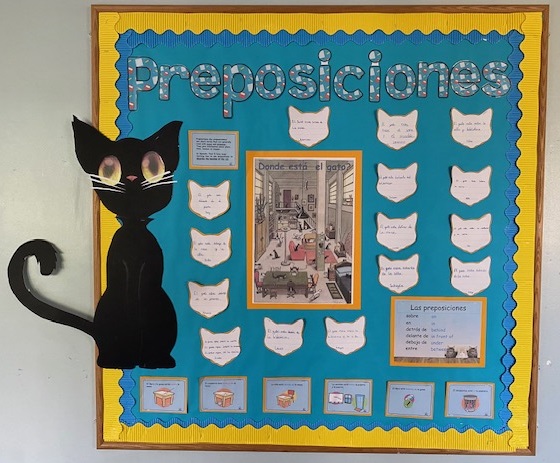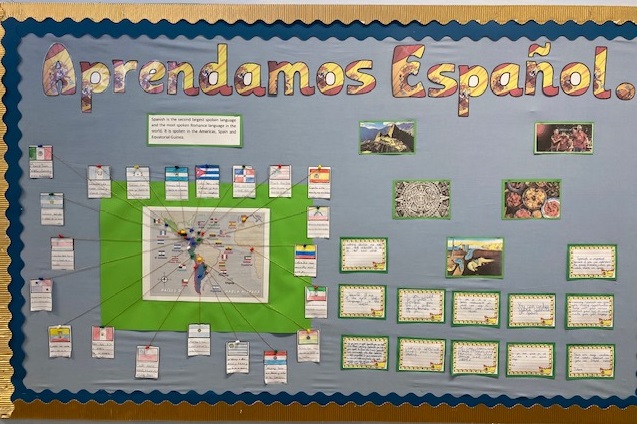Modern Foreign Languages Curriculum Overview
| Year | 3 | 4 | 5 | 6 |
|---|---|---|---|---|
| Autumn 1 |
Greetings and Spanish culture - Classroom instructions - Animals vocabulary - Numbers and plurals Soft ‘ci’ , ‘R’ phoneme |
Revise animals and classroom instructions - A Spanish poem - How to use a Spanish bilingual dictionary - Parts of the body - Negative ‘no’ soft c, z phonemes |
Revise opinions - Sports vocabulary - Sports clothing - Verb tener - Negative - Masculine & feminine nouns - Dictionary skills - Preposition para (for) i phoneme |
Revise tener and ser - Questions - Telling the time - Daily routine |
| Autumn 2 |
Connectives & simple sentences - Gender - Memorisation & storytelling Saying my name - Christmas - Christmas song - Soy (I have) I phoneme |
Colours - Adjectival agreements - Food - Opinions about food - Goldilocks story Christmas: the snowman - son (they are) - Christmas traditions a phoneme |
Weather vocabulary - Hobbies - vocabulary - Pets - Traditional tale: The fox and the crow - Christmas in Spain j, qu phonemes |
Daily routine in other countries - Houses - Rooms in a house - Christmas: presents |
| Spring 1 |
Spanish names - Colours - Opinions - Word order of adjectival order - Traditional story: The Enormous turnip A, E, J, R phonemes |
Quisiera with food - Revise numbers 1-15 - Months - Numbers 16-31 - Spanish maths:division and multiplication - Word order - Me gustan with plural nouns - Quiero Hard c, ll, qu, ch, phonemes |
Verb ser - Dictionary skills - Revise dates, months - Legends - Numbers 32-60 - School subjects - The three wise men u phoneme |
Tener phrases - Puedo + infinitive - Bedroom descriptions - Places in a town |
| Spring 2 |
Numbers 1-10 - Spanish maths: addition and - subtraction - Tengo (I have) - Age - Easter bunny/eggs |
Dates and birthdays - Revise numbers 1-31 - Third person - Personal descriptions (hair and eye colour) - Easter: Las Fallas festival J, soft c phonemes |
Primary school in Spain - Subject preferences - Telling the time - Reasons - Verb ir - Transport vocabulary - Easter: Los tres magos (three kings) - Project: Easter cards Silent h phoneme |
Revise places in town - Revise ir - Directions - Revise food - Buying food - April fool’s day - Toys around the world |
| Summer 1 |
Definite (el,la,los,las) and indefinite (un, una, unos, unas) articles - Quisiera (I would like) - Extending sentences with pero Hard C phoneme |
Family vocabulary Possessive adjectives (mi, mis) Further dictionary skills - Clothing vocabulary - Revise adjectival agreements i phoneme |
Items in a classroom - Possessive adjectives (revision and new) - Prepositions hard c phoneme |
Numbers 61-100 - Ordering food in a café - Famous Spanish food and menus - The preterite (past) tense |
| Summer 2 |
Es - Extending sentences with también - Numbers 1-15 - Days of the week - Assessments Barcelona project R, U, I, hard g phonemes |
Memorise a short text - (Talk4writing) Revise food, opinions, months, numbers and personal descriptions - Assessments - Spanish festival project ll phoneme |
Revise ir, key phonemes - The simple future tense - Alphabet - Revision - Assessments Project: Day of the dead |
The preterite (past) tense - Revision - Assessments - The Spanish alphabet |
Intent
A high-quality languages education should foster pupils’ curiosity and deepen their understanding of the world. The teaching should enable pupils to express their ideas and thoughts in another language and to understand and respond to its speakers, both in speech and in writing.’ (National Curriculum 2014 – Appendix A)
Learning a language enriches the curriculum, helping to create enthusiastic learners and to develop positive attitudes to language learning. The skills, knowledge and understanding gained contribute to the development of children’s oracy and their understanding of grammatical structures. At The William Hogarth School, we aim to prepare children for the rigours of learning a language at Key Stage 3 so that they can make a successful and confident transfer to secondary school.
Our aim is for pupils to be able to:
- understand and respond to spoken and written language from a variety of authentic sources
- speak with increasing confidence, fluency and spontaneity, finding ways of communicating what they want to say, including through discussion and asking questions, and continually improving the accuracy of their pronunciation and intonation
- write at varying length, for different purposes and audiences, using the variety of grammatical structures that they have learnt
- discover and develop an appreciation of a range of writing in the language studied.
Our curriculum provides an appropriate balance of spoken and written language and lays the foundations for further foreign language teaching at Key Stage 3. It enables pupils to understand and communicate ideas, facts and feelings in speech and writing, focused on familiar and routine matters, using their knowledge of phonology, grammatical structures and vocabulary.
Implementation
Children in Key Stage 2 (Year 3 – Year 6) enjoy 45 minute Spanish lessons weekly. Lessons are delivered by a first language speaker to support the children’s accurate phonological development in the language. Teaching and learning follows the ‘iLanguages’ programme of study which ensures clear progression in the development of the four main skills children need to build proficiency in when learning another language:
- speaking
- listening
- reading
- writing
Children are taught using a range of strategies to support the inclusion of all pupils, including:
- Games (developing vocabulary through repetition; embedding speaking and listening in play)
- Songs and rhymes (building phonetic awareness, pattern and sound through memory)
- Role play (developing vocabulary in contexts that are familiar to the children)
Impact
Children are taught to:
- listen attentively to spoken language and show understanding by joining in and responding
- explore the patterns and sounds of language through songs and rhymes and link the spelling, sound and meaning of words
- engage in conversations; ask and answer questions; express opinions and respond to those of others; seek clarification and help
- speak in sentences, using familiar vocabulary, phrases and basic language structures
- develop accurate pronunciation and intonation so that others understand when they are reading aloud or using familiar words and phrases
- present ideas and information orally to a range of audiences
- read carefully and show understanding of words, phrases and simple writing
- appreciate stories, songs, poems and rhymes in the language
- broaden their vocabulary and develop their ability to understand new words that are introduced into familiar written material, including through using a dictionary
- write phrases from memory, and adapt these to create new sentences, to express ideas clearly
- describe people, places, things and actions orally and in writing
- understand basic grammar appropriate to the language being studied, including: feminine, masculine forms and the conjugation of high-frequency verbs; key features and patterns of the language; how to apply these, for instance, to build sentences; and how these differ from or are similar to English.

